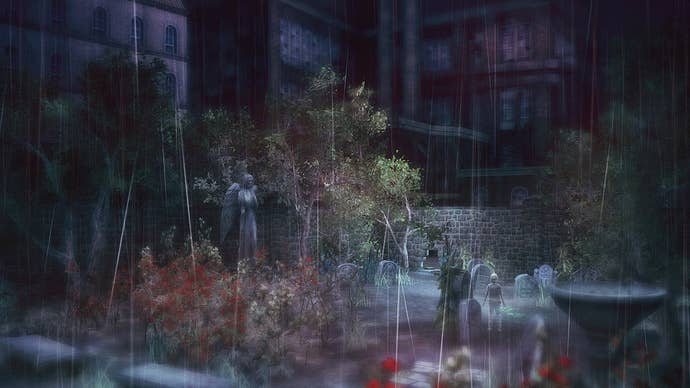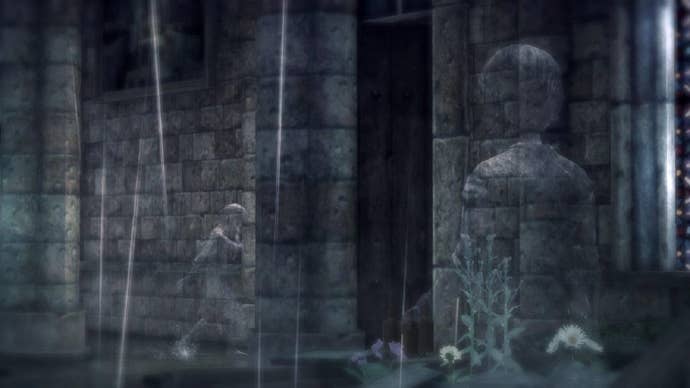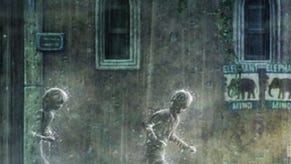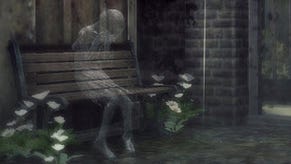Rain Review
Sony's C.A.M.P. team once again proves the power of unconventional ideas.
This article first appeared on USgamer, a partner publication of VG247. Some content, such as this article, has been migrated to VG247 for posterity after USgamer's closure - but it has not been edited or further vetted by the VG247 team.
The long-delayed The Last Guardian may be moldering away somewhere in the Sony Vault, but that doesn't mean gaming auteur Fumito Ueda's voice has gone unheard since 2005's phenomenal Shadow of the Colossus.
Though it's taken nearly a decade, other developers have picked up where Ueda's stalled career left off, most recently with the touching Brothers: A Tale of Two Sons, which borrowed much of Ico's minimalist magic to deliver an amazing and altogether different experience. PlayStation C.A.M.P.'s Rain also takes a page from this very distinct book by crafting a succinct adventure full of clever environmental puzzles, tucked away inside a story that places the onus of interpretation squarely on the player.
As with Brothers, Rain doesn't pilfer the content of Ueda's work so much as it fully understands his philosophy of "design by subtraction." You'll find no GUI, items, stats, or dialogue cluttering up the well-realized environments of Rain, and while some form of textual narration exists, it superimposes itself over the background as your character runs by, freeing the experience from any interruptions. In fact, given that the protagonist spends a good portion of the game absolutely invisible, at times the only additions to Rain's world take the form of wet footsteps silently creeping by.

For how wrong stealth gameplay can go, it takes an astounding amount of confidence to integrate something unfriendly like "invisibility" as a core idea, but Rain makes its premise easy to understand: When you're out in the elements, enemies can see you, but when you take shelter, they can't. When using this trick to escape from pursuers, though, you also can't see yourself, which lends an extra bit of tension to escape sequences, as you scan the ground for the telltale footsteps and scattered objects indicating your position.
Thankfully, C.A.M.P. isn't too ambitious with Rain's design, and each stealth puzzle has an extremely straightforward solution that should strike you after a few rounds of trial and error -- not to mention the most generous checkpoint system I've ever seen in a Japanese video game. While Rain features only a handful of enemies, the game manages to add enough twists to their behavior that finding new ways to escape their grasp never becomes dull. And Rain paces itself very well, spacing out its tense sneaking bits with exciting chases, puzzle-platforming, and slow, contemplative sections engineered to let you soak up the scenery. Those antiquated predetermined camera angles may at first seem like a relic of game design past, but Rain proves how effective they can be when used thoughtfully.
Rain has arrived at a strange time in Sony's life; months after David Cage took to the stage, stressing the importance of how new technology will allow us to -- at long last! -- emotionally connect with games, here we have something that could have been pulled off on the PlayStation 2 (albeit at a lower resolution), yet produced at a mere fraction of the cost of its triple-A betters. The water effects in Rain aren't necessarily dripping with realism, but they lend to the its riveting atmosphere, which shifts from tension to wonderment and back again without the slightest hint of whiplash. The sound design also lends much to Rain's world (especially with a nice set of headphones), as the ever-present rainfall combined with the thup-thup-thup of wet feet on pavement perfectly complement Yuugo Kanno's moving soundtrack, which I'd often let loop a few times before moving on to the next area. (I'm hoping/praying for an official release in the near future.)

Rain won't take you more than a few afternoons to complete, but it manages to reach its conclusion before tedium could possibly set in. And while it offers some replay value by dropping some story-explaining collectibles throughout a second playthrough, Rain's explicit narrative fed me the perfect amount of information the first time around. In a sense, it's a shame that C.A.M.P. seems to be hitting their stride just as Sony started making preparations for the PS3's funeral, but projects like Rain make me extremely hopeful for future headstrong experiments from this extremely talented team.
The Details
- Visuals: Rain doesn't exactly look like a late-gen PS3 title, but C.A.M.P. prefers style over technical wizardry.
- Audio: Water, water, everywhere; play with a good set of headphones on and don't be surprised if your fingers start to feel pruny.
- Interface: Given its minimalistic nature, the controls are as simple and straightforward as they should be.
- Lasting Appeal: The post-game incentives aren't worth digging into, but Rain is a short enough experience (3-4 hours) to burn away any future boring afternoon.
ConclusionIf Tokyo Jungle didn't make you believe in C.A.M.P, Rain certainly will. With all of the doom and gloom about how Japan can't compete with Western megahits, it's definitely refreshing to see these smaller projects feel so tightly designed and well-realized. In a world where Ico was the hit it should have been, we would have been seeing games like Rain a lot sooner than 2013.






